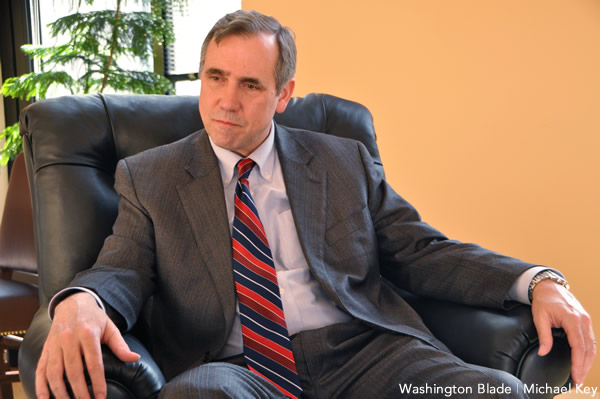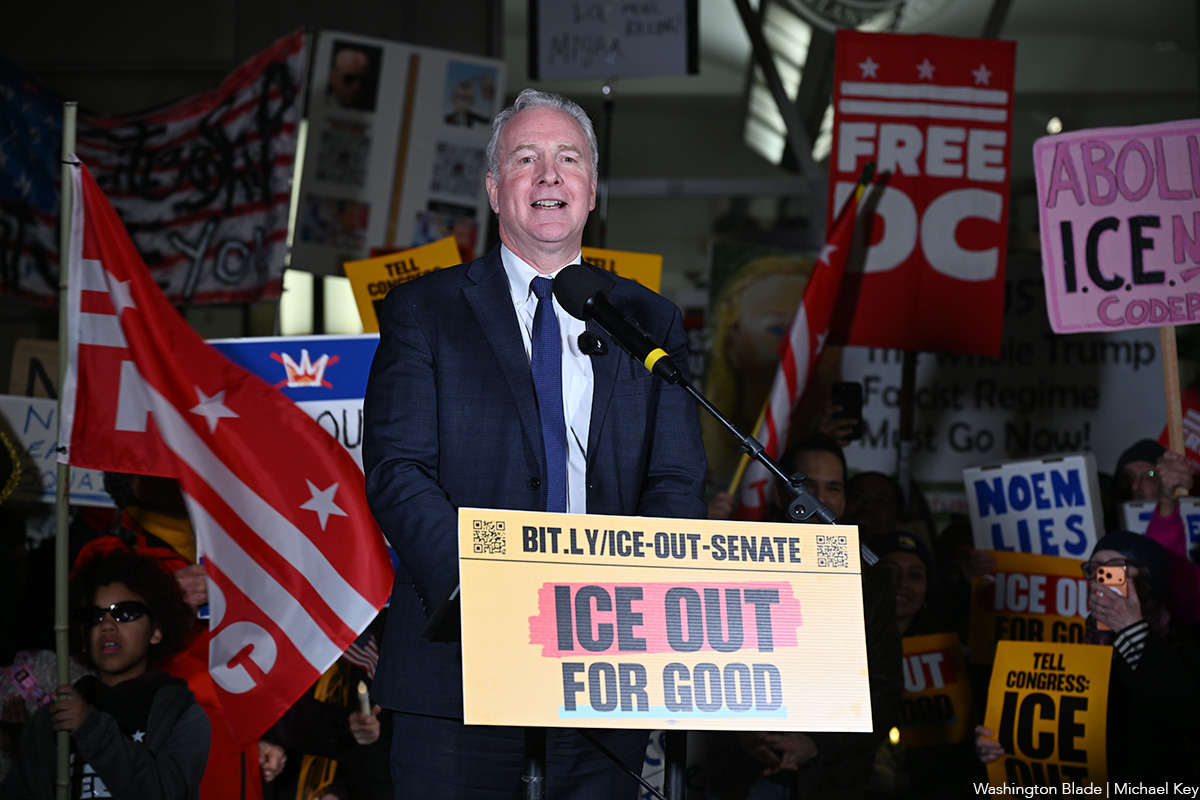Politics
Sen. Merkley bullish on prospects for ENDA
Says he’s talked with Portman, sees committee vote in May or June


Sen. Jeff Merkley (D-Ore.) talks about ENDA in an interview with the Washington Blade. (Washington Blade photo by Michael Key)
The lead sponsor of the Employment Non-Discrimination Act in the Senate is excited about the bill’s prospects upon reintroduction and anticipates committee action in May or June.
In an interview with the Washington Blade on Tuesday, Sen. Jeff Merkley (D-Ore.) talked about the future for ENDA, which he’s planning to introduce on Thursday. The bill is set to debut on the same day as the House version by gay Rep. Jared Polis (D-Colo.).
Merkley, who prior to being elected as U.S. senator was Oregon State House Speaker, said he’s “very excited” about leading the fight on ENDA for two reasons: it builds off the state LGBT non-discrimination legislation he helped usher into law in 2007, and it honors the legacy of the late Sen. Edward Kennedy, who previously championed ENDA.
“Part of the reason it’s exciting to me is I led the fight in Oregon for basic rights,” Merkley said. “It was a huge honor to have Sen. Kennedy ask me to carry the torch on this bill. And I want to fulfill the responsibility he gave me of getting the bill passed in the Senate. I think we’re going to be a lot of closer. We have a chance of getting this done, and getting it done this year.”
Merkley said he’s spoken with the Senate Health, Education, Labor & Pensions Committee Chair Tom Harkin (D-Iowa), who’s already pledged to have a panel vote on ENDA this year, and received assurances a markup would happen in the coming months.
“He was very publicly saying the moment he got the bill in his hands — as soon as it was introduced — that he wanted to move forward quickly,” Merkley said. “My understanding, to be confirmed obviously in conversations with him, is he’d like to have the markup in May or June.”
The Oregon senator affirmed the Senate version of the bill would have five original co-sponsors: himself, Harkin as well as lesbian Sen. Tammy Baldwin (D-Wis.) and Republican Sens. Susan Collins (Maine) and Mark Kirk (Ill.). On Friday, the legislation will be open to additional co-sponsors.
Merkley also confirmed that two areas that were previously under reconsideration with respect to ENDA — the religious exemption and no mention of disparate impact — would be unchanged upon reintroduction.
However, Merkley said ENDA would be different because other provisions were modified following conversations with stakeholders and with Republican partners.
Among the changes relates to shared facilities. The previous version of ENDA stated an employer wouldn’t be in violation of the law if it denied a transgender person access to dressing facilities in which being seen unclothed is unavoidable — provided that the company provides access to adequate facilities consistent with the employee’s gender identity. Merkley said the new version of ENDA won’t address the issue of shared facilities.
“We’re going to adopt the model that has been the dominant state model, which is simply not to have discussion on facilities in any of the sections of the bill, which is what the states have done and it’s worked very well,” Merkley said.
The Oregon senator is eager for a full Senate floor vote on ENDA once the bill is moved out of committee, saying, “I think it’s time for every senator to have to take a position on this.”
“We have senators who have been silent on where they stand,” Merkley said. “We have other senators who may have been recognizing they have been hesitant before, but really there’s a hugely compelling principle at stake here: that of equal opportunity to be a full participant in our economy. It’s only right and just that people not be discriminated against in employment.”
And Merkley was bullish about reaching the 60-vote threshold in the Senate to end a filibuster on the legislation in the wake of additional senators coming out in support of marriage equality.
“I think I was the ninth,” Merkley said. “Now there are over 50. That’s a huge transformation in four years. I can’t imagine that anyone who is supportive of marriage equality wouldn’t also fully be there on non-discrimination.”
All eyes will be one of those lawmakers in particular, Sen. Rob Portman (R-Ohio), who came out in favor of marriage equality after learning that his son is gay. Merkley said he’s spoken to Portman about ENDA, as well as other Republican senators, but wouldn’t divulge what the response was in these conversations.
“I’ve lobbied him and let him know I’m going to bring him back the details and work with him, and he acknowledged it,” Merkley said. “So, he’ll have to choose his own moment of what he says to the public.”
Asked whether ENDA stands a better chance at becoming law now than it did in the 112th Congress, Merkley replied, “Yes, society is way ahead of Congress. The attitudes in state after state are changing. Certainly the conversations regarding marriage equality have changed.”
As Merkley lobbies his colleagues on ENDA, the senator said he doesn’t think pressure from the White House would be useful to move forward with the legislation. Groups like Freedom to Work have been asking President Obama to call publicly for a floor vote and lobby senators on ENDA.
“I’m not sure that that’s helpful,” Merkley said. “We have the business community on board, we have commerce, we have the majority of Fortune 500 companies. I think people hearing from their home state businesses that have recognized that this is the right and good thing to do is a very powerful voice — home state interest groups as well.”
Still, Merkley said he continues to want to see administrative action against LGBT workplace discrimination in the form of an executive order barring it among federal contractors. The senator has been one of the leading lawmakers on Capitol Hill calling for the directive.
“I’ve been encouraging the administration to do what they can within their own world, which is of government contractors in employment discrimination among the contractors,” Merkley said. “I think discrimination is so abhorrent that it should be ended through any means available. I’ll keep encouraging them to do that, but maybe we can pass this bill and get it to the president and accomplish it for the entire working world at once.”
The White House continues to say in response to questions about the executive order that it prefers a legislative approach to address the issue of LGBT workplace discrimination. Merkley said he’s received no indications that the administration is reconsidering its position.
“My impression is they’re not moving quickly in that area,” Merkley said.
Congress
McBride, other US lawmakers travel to Denmark
Trump’s demand for Greenland’s annexation overshadowed trip

Delaware Congresswoman Sarah McBride is among the 11 members of Congress who traveled to Denmark over the past weekend amid President Donald Trump’s continued calls for the U.S. to take control of Greenland.
McBride, the first openly transgender person elected to Congress, traveled to Copenhagen, the Danish capital, with U.S. Sens. Chris Coons (D-Del.), Thom Tillis (R-N.C.), Jeanne Shaheen (D-N.H.), Dick Durbin (D-Ill.), and Lisa Murkowski (R-Alaska) and U.S. Reps. Steny Hoyer (D-Md.), Gregory Meeks (D-N.Y.), Madeleine Dean (D-Pa.), Don Bacon (R-Neb.), and Sarah Jacobs (D-Calif.). The lawmakers met with Danish Prime Minister Mette Frederiksen and Greenlandic MP Pipaluk Lynge, among others.
“I’m grateful to Sen. Coons for his leadership in bringing together a bipartisan, bicameral delegation to reaffirm our support in Congress for our NATO ally, Denmark,” said McBride in a press release that detailed the trip. “Delaware understands that our security and prosperity depend on strong partnerships rooted in mutual respect, sovereignty, and self-determination. At a time of growing global instability, this trip could not be more poignant.”
Greenland is a self-governing territory of Denmark with a population of less than 60,000 people. Trump maintains the U.S. needs to control the mineral-rich island in the Arctic Ocean between Europe and North America because of national security.
The Associated Press notes thousands of people on Saturday in Nuuk, the Greenlandic capital, protested against Trump. British Prime Minister Keir Starmer is among those who have criticized Trump over his suggestion the U.S. would impose tariffs against countries that do not support U.S. annexation of Greenland.
A poll that Sermitsiaq, a Greenlandic newspaper, and Berlingske, a Danish newspaper, commissioned last January indicates 85 percent do not want Greenland to become part of the U.S. The pro-independence Demokraatit party won parliamentary elections that took place on March 12, 2025.
“At this critical juncture for our countries, our message was clear as members of Congress: we value the U.S.-Denmark partnership, the NATO alliance, and the right of Greenlanders to self-determination,” said McBride on Sunday in a Facebook post that contained pictures of her and her fellow lawmakers meeting with their Danish and Greenlandic counterparts.
Congress
Van Hollen speaks at ‘ICE Out for Good’ protest in D.C.
ICE agent killed Renee Nicole Good in Minneapolis on Jan. 7

U.S. Sen. Chris Van Hollen (D-Md.) is among those who spoke at an “ICE Out for Good” protest that took place outside U.S. Customs and Border Protection’s headquarters in D.C. on Tuesday.
The protest took place six days after a U.S. Immigration and Customs Enforcement agent shot and killed Renee Nicole Good, a 37-year-old woman in Minneapolis.
Good left behind her wife and three children.
(Video by Michael K. Lavers)
Congress
Advocates say MTG bill threatens trans youth, families, and doctors
The “Protect Children’s Innocence” Act passed in the House

Georgia Congresswoman Marjorie Taylor Greene has a long history of targeting the transgender community as part of her political agenda. Now, after announcing her resignation from the U.S. House of Representatives, attempting to take away trans rights may be the last thing she does in her official capacity.
The proposed legislation, dubbed “Protect Children’s Innocence Act” is among the most extreme anti-trans measures to move through Congress. It would put doctors in jail for up to 10 years if they provide gender-affirming care to minors — including prescribing hormone replacement therapy to adolescents or puberty blockers to younger children. The bill also aims to halt gender-affirming surgeries for minors, though those procedures are rare.
Greene herself described the bill on X, saying if passed, “it would make it a Class C felony to trans a child under 18.”
According to KFF, a nonpartisan source for health policy research, polling, and journalism, 27 states have enacted policies limiting youth access to gender-affirming care. Roughly half of all trans youth ages 13–17 live in a state with such restrictions, and 24 states impose professional or legal penalties on health care practitioners who provide that care.
Greene has repeatedly introduced the bill since 2021, the year she entered Congress, but it failed to advance. Now, in exchange for her support for the National Defense Authorization Act, the legislation reached the House floor for the first time.
According to the 19th, U.S. Rep. Sarah McBride (D-Del.), the first trans member of Congress, rebuked Republicans on the Capitol steps Wednesday for advancing anti-trans legislation while allowing Affordable Care Act tax credits to expire — a move expected to raise health care costs for millions of Americans.
“They would rather have us focus in and debate a misunderstood and vulnerable one percent of the population, instead of focusing in on the fact that they are raiding everyone’s health care,” McBride said. “They are obsessed with trans people … they are consumed with this.”
Polling suggests the public largely opposes criminalizing gender-affirming care.
A recent survey by the Human Rights Campaign and Global Strategy Group found that 73 percent of voters in U.S. House battleground districts oppose laws that would jail doctors or parents for providing transition-related care. Additionally, 77 percent oppose forcing trans people off medically recommended medication. Nearly seven in 10 Americans said politicians are not informed enough to make decisions about medical care for trans youth.
The bill passed the House and now heads to the U.S. Senate for further consideration.
According to reporting by Erin Reed of Erin In The Morning, three Democrats — U.S. Reps. Henry Cuellar and Vicente Gonzalez of Texas and Don Davis of North Carolina — crossed party lines to vote in favor of the felony ban, joining 213 Republicans. A total of 207 Democrats voted against the bill, while three lawmakers from both parties abstained.
Advocates and lawmakers warned the bill is dangerous and unprecedented during a multi-organizational press call Tuesday. Leaders from the Human Rights Campaign and the Trevor Project joined U.S. Rep. Becca Balint (D-Vt.), Dr. Kenneth Haller, and parents of trans youth to discuss the potential impact of restrictive policies like Greene’s — particularly in contrast to President Donald Trump’s leniency toward certain criminals, with more than 1,500 pardons issued this year.
“Our MAGA GOP government has pardoned drug traffickers. They’ve pardoned people who tried to overthrow the government on January 6, but now they want to put pediatricians and parents into a jail cell for caring for their kids,” said Human Rights Campaign President Kelley Robinson. “No one asked for Marjorie Taylor Greene or Dan Crenshaw or any politician to be in their doctor’s office, and they should mind their own business.”
Balint, co-chair of the Congressional Equality Caucus, questioned why medical decisions are being made by lawmakers with no clinical expertise.
“Parents and doctors already have to worry about state laws banning care for their kids, and this bill would introduce the risk of federal criminal prosecution,” Balint said. “We’re talking about jail time. We’re talking about locking people up for basic medical care, care that is evidence-based, age-appropriate and life-saving.”
“These are decisions that should be made by doctors and parents and those kids that need this gender-affirming care, not certainly by Marjorie Taylor Greene.”
Haller, an emeritus professor of pediatrics at St. Louis University School of Medicine, described the legislation as rooted in ideology rather than medicine.
“It is not science, it is just blind ideology,” Haller said.
“The doctor tells you that as parents, as well as the doctor themselves, could be convicted of a felony and be sentenced up to 10 years in prison just for pursuing a course of action that will give your child their only chance for a happy and healthy future,” he added. “It is not in the state’s best interests, and certainly not in the interests of us, the citizens of this country, to interfere with medical decisions that people make about their own bodies and their own lives.”
Haller’s sentiment is echoed by doctors across the country.
The American Medical Association, the nation’s largest organization that represents doctors across the country in various parts of medicine has a longstanding support for gender-affirming care.
“The AMA supports public and private health insurance coverage for treatment of gender dysphoria and opposes the denial of health insurance based on sexual orientation or gender identity,” their website reads.
Rodrigo Heng-Lehtinen, senior vice president of public engagement campaigns at the Trevor Project, agreed.
“In Marjorie Taylor Greene’s bill [it] even goes so far as to criminalize and throw a parent in jail for this,” Heng-Lehtinen said. “Medical decisions should be between patients, families, and their doctors.”
Rachel Gonzalez, a parent of a transgender teen and LGBTQ advocate, said the bill would harm families trying to act in their children’s best interests.
“No politician should be in any doctor’s office or in our living room making private health care decisions — especially not Marjorie Taylor Greene,” Gonzalez said. “My daughter and no trans youth should ever be used as a political pawn.”
Other LGBTQ rights activists also condemned the legislation.
Tyler Hack, executive director of the Christopher Street Project, called the bill “an abominable attack on the transgender community.”
“Marjorie Taylor Greene’s last-ditch effort to bring her 3-times failed bill to a vote is an abominable attack on the transgender community and further cements a Congressional career defined by hate and bigotry,” they said. “We are counting down the days until she’s off Capitol Hill — but as the bill goes to the floor this week, our leaders must stand up one last time to her BS and protect the safety of queer kids and medical providers. Full stop.”
Hack added that “healthcare is a right, not a privilege” in the U.S., and this attack on trans healthcare is an attack on queer rights altogether.
“Marjorie Taylor Greene has no place in deciding what care is necessary,” Hack added. “This is another attempt to legislate trans and queer people out of existence while peddling an agenda rooted in pseudoscience and extremism.”
U.S. Rep. Mark Takano (D-Calif.), chair of the Congressional Equality Caucus, also denounced the legislation.
“This bill is the most extreme anti-transgender legislation to ever pass through the House of Representatives and a direct attack on the rights of parents to work with their children and their doctors to provide them with the medical care they need,” Takano said. “This bill is beyond cruel and its passage will forever be a stain on the institution of the United States Congress.”
The bill is unlikely to advance in the Senate, where it would need 60 votes to pass.
-

 Federal Government5 days ago
Federal Government5 days agoTop Democrats reintroduce bill to investigate discrimination against LGBTQ military members
-

 Virginia5 days ago
Virginia5 days agoFrom the Pentagon to politics, Bree Fram fighting for LGBTQ rights
-

 Iran4 days ago
Iran4 days agoTwo gay men face deportation to Iran
-

 Commentary4 days ago
Commentary4 days agoDefunding LGBTQ groups is a warning sign for democracy















